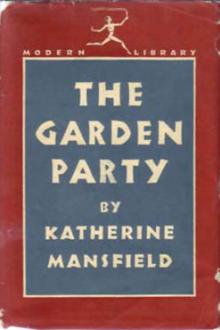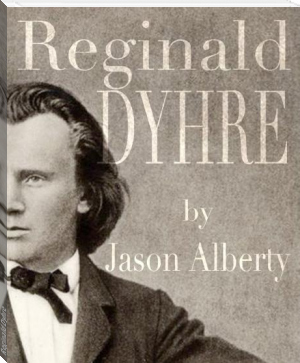Bliss - Katherine Mansfield (paper ebook reader TXT) 📗

- Author: Katherine Mansfield
- Performer: -
Book online «Bliss - Katherine Mansfield (paper ebook reader TXT) 📗». Author Katherine Mansfield
Bliss
and Other Stories
by Katherine Mansfield
NEW YORK
ALFRED A KNOPF
MCMXXII
Published, 1920
Reprinted 1920
Reprinted 1921
Reprinted 1921
Reprinted 1921
Reprinted 1922
Reprinted 1922
Printed in Great Britain at
The Mayflower Press, Plymouth.
William Brendon & Son, Ltd.
To John Middleton Murray
CONTENTS
PRELUDE
JE NE PARLE PAS FRANCAIS
BLISS
THE WIND BLOWS
PSYCHOLOGY
PICTURES
THE MAN WITHOUT A TEMPERAMENT
MR. REGINALD PEACOCK’S DAY
SUN AND MOON
FEUILLE D’ALBUM
A DILL PICKLE
THE LITTLE GOVERNESS
REVELATIONS
THE ESCAPE
PRELUDE
1THERE was not an inch of room for Lottie and Kezia in the buggy. When Pat swung them on top of the luggage they wobbled; the grandmother’s lap was full and Linda Burnell could not possibly have held a lump of a child on hers for any distance. Isabel, very superior, was perched beside the new handy-man on the driver’s seat. Holdalls, bags and boxes were piled upon the floor. “These are absolute necessities that I will not let out of my sight for one instant,” said Linda Burnell, her voice trembling with fatigue and excitement.
Lottie and Kezia stood on the patch of lawn just inside the gate all ready for the fray in their coats with brass anchor buttons and little round caps with battleship ribbons. Hand in hand, they stared with round solemn eyes, first at the absolute necessities and then at their mother.
“We shall simply have to leave them. That is all. We shall simply have to cast them off,” said Linda Burnell. A strange little laugh flew from her lips; she leaned back against the buttoned leather cushions and shut her eyes, her lips trembling with laughter. Happily at that moment Mrs. Samuel Josephs, who had been watching the scene from behind her drawing-room blind, waddled down the garden path.
“Why nod leave the chudren with be for the afterdoon, Brs. Burnell? They could go on the dray with the storeban when he comes in the eveding. Those thigs on the path have to go, dod’t they?”
“Yes, everything outside the house is supposed to go,” said Linda Burnell, and she waved a white hand at the tables and chairs standing on their heads on the front lawn. How absurd they looked! Either they ought to be the other way up, or Lottie and Kezia ought to stand on their heads, too. And she longed to say: “Stand on your heads, children, and wait for the storeman.” It seemed to her that would be so exquisitely funny that she could not attend to Mrs. Samuel Josephs.
The fat creaking body leaned across the gate, and the big jelly of a face smiled. “Dod’t you worry, Brs. Burnell. Loddie and Kezia can have tea with my chudren in the dursery, and I’ll see theb on the dray afterwards.”
The grandmother considered. “Yes, it really is quite the best plan. We are very obliged to you, Mrs. Samuel Josephs. Children, say ‘thank you’ to Mrs. Samuel Josephs.”
Two subdued chirrups: “Thank you, Mrs. Samuel Josephs.”
“And be good little girls, and—come closer—” they advanced, “don’t forget to tell Mrs. Samuel Josephs when you want to…. “
“No, granma.”
“Dod’t worry, Brs. Burnell.”
At the last moment Kezia let go Lottie’s hand and darted towards the buggy.
“I want to kiss my granma good-bye again.”
But she was too late. The buggy rolled off up the road, Isabel bursting with pride, her nose turned up at all the world, Linda Burnell prostrated, and the grandmother rummaging among the very curious oddments she had had put in her black silk reticule at the last moment, for something to give her daughter. The buggy twinkled away in the sunlight and fine golden dust up the hill and over. Kezia bit her lip, but Lottie, carefully finding her handkerchief first, set up a wail.
“Mother! Granma!”
Mrs. Samuel Josephs, like a huge warm black silk tea cosy, enveloped her.
“It’s all right, by dear. Be a brave child. You come and blay in the dursery!”
She put her arm round weeping Lottie and led her away. Kezia followed, making a face at Mrs. Samuel Josephs’ placket, which was undone as usual, with two long pink corset laces hanging out of it….
Lottie’s weeping died down as she mounted the stairs, but the sight of her at the nursery door with swollen eyes and a blob of a nose gave great satisfaction to the S.J.‘s, who sat on two benches before a long table covered with American cloth and set out with immense plates of bread and dripping and two brown jugs that faintly steamed.
“Hullo! You’ve been crying!”
“Ooh! Your eyes have gone right in.”
“Doesn’t her nose look funny.”
“You’re all red-and-patchy.”
Lottie was quite a success. She felt it and swelled, smiling timidly.
“Go and sit by Zaidee, ducky,” said Mrs. Samuel Josephs, “and Kezia, you sid ad the end by Boses.”
Moses grinned and gave her a nip as she sat down; but she pretended not to notice. She did hate boys.
“Which will you have?” asked Stanley, leaning across the table very politely, and smiling at her. “Which will you have to begin with—strawberries and cream or bread and dripping?”
“Strawberries and cream, please,” said she.
“Ah-h-h-h.” How they all laughed and beat the table with their teaspoons. Wasn’t that a take-in! Wasn’t it now! Didn’t he fox her! Good old Stan!
“Ma! She thought it was real.”
Even Mrs. Samuel Josephs, pouring out the milk and water, could not help smiling. “You bustn’t tease theb on their last day,” she wheezed.
But Kezia bit a big piece out of her bread and dripping, and then stood the piece up on her plate. With the bite out it made a dear little sort of gate. Pooh! She didn’t care! A tear rolled down her cheek, but she wasn’t crying. She couldn’t have cried in front of those awful Samuel Josephs. She sat with her head bent, and as the tear dripped slowly down, she caught it with a neat little whisk of her tongue and ate it before any of them had seen.
2After tea Kezia wandered back to their own house. Slowly she walked up the back steps, and through the scullery into the kitchen. Nothing was left in it but a lump of gritty yellow soap in one corner of the kitchen window-sill and a piece of flannel stained with a blue bag in another. The fireplace was choked up with rubbish. She poked among it but found nothing except a hair-tidy with a heart painted on it that had belonged to the servant girl. Even that she left lying, and she trailed through the narrow passage into the drawing-room. The Venetian blind was pulled down but not drawn close. Long pencil rays of sunlight shone through and the wavy shadow of a bush outside danced on the gold lines. Now it was still, now it began to flutter again, and now it came almost as far as her feet. Zoom! Zoom! a blue-bottle knocked against the ceiling; the carpet-tacks had little bits of red fluff sticking to them.
The dining-room window had a square of coloured glass at each corner. One was blue and one was yellow. Kezia bent down to have one more look at a blue lawn with blue arum lilies growing at the gate, and then at a yellow lawn with yellow lilies and a yellow fence. As she looked a little Chinese Lottie came out on to the lawn and began to dust the tables and chairs with a corner of her pinafore. Was that really Lottie? Kezia was not quite sure until she had looked through the ordinary window.
Upstairs in her father’s and mother’s room she found a pill box black and shiny outside and red in, holding a blob of cotton wool.
“I could keep a bird’s egg in that,” she decided.
In the servant girl’s room there was a stay-button stuck in a crack of the floor, and in another crack some beads and a long needle. She knew there was nothing in her grandmother’s room; she had watched her pack. She went over to the window and leaned against it, pressing her hands to the pane.
Kezia liked to stand so before the window. She liked the feeling of the cold shining glass against her hot palms, and she liked to watch the funny white tops that came on her fingers when she pressed them hard against the pane. As she stood there, the day flickered out and dark came. With the dark crept the wind snuffling and howling. The windows of the empty house shook, a creaking came from the walls and floors, a piece of loose iron on the roof banged forlornly. Kezia was suddenly quite, quite still, with wide open eyes and knees pressed together. She was frightened. She wanted to call Lottie and to go on calling all the while she ran downstairs and out of the house. But IT was just behind her, waiting at the door, at the head of the stairs, at the bottom of the stairs, hiding in the passage, ready to dart out at the back door. But Lottie was at the back door, too.
“Kezia!” she called cheerfully. “The storeman’s here. Everything is on the dray and three horses, Kezia. Mrs. Samuel Josephs has given us a big shawl to wear round us, and she says to button up your coat. She won’t come out because of asthma.”
Lottie was very important.
“Now then, you kids,” called the storeman. He hooked his big thumbs under their arms and up they swung. Lottie arranged the shawl “most beautifully” and the storeman tucked up their feet in a piece of old blanket.
“Lift up. Easy does it.”
They might have been a couple of young ponies. The storeman felt over the cords holding his load, unhooked the brakechain from the wheel, and whistling, he swung up beside them.
“Keep close to me,” said Lottie, “because otherwise you pull the shawl away from my side, Kezia.”
But Kezia edged up to the storeman. He towered beside her big as a giant and he smelled of nuts and new wooden boxes.
3It was the first time that Lottie and Kezia had ever been out so late. Everything looked different—the painted wooden houses far smaller than they did by day, the gardens far bigger and wilder. Bright stars speckled the sky and the moon hung over the harbour dabbling the waves with gold. They could see the lighthouse shining on Quarantine Island, and the green lights on the old coal hulks.
“There comes the Picton boat,” said the storeman, pointing to a little steamer all hung with bright beads.
But when they reached the top of the hill and began to go down the other side the harbour disappeared, and although they were still in the town they were quite lost. Other carts rattled past. Everybody knew the storeman.
“Night, Fred.”
“Night O,” he shouted.
Kezia liked very much to hear him. Whenever a cart appeared in the distance she looked up and waited for his voice. He was an old friend; and she and her grandmother had often been to his place to buy grapes. The storeman lived alone in a cottage that had a glasshouse against one wall built by himself. All the glasshouse was spanned and arched over with one beautiful vine. He took her brown basket from her, lined it with three large





Comments (0)